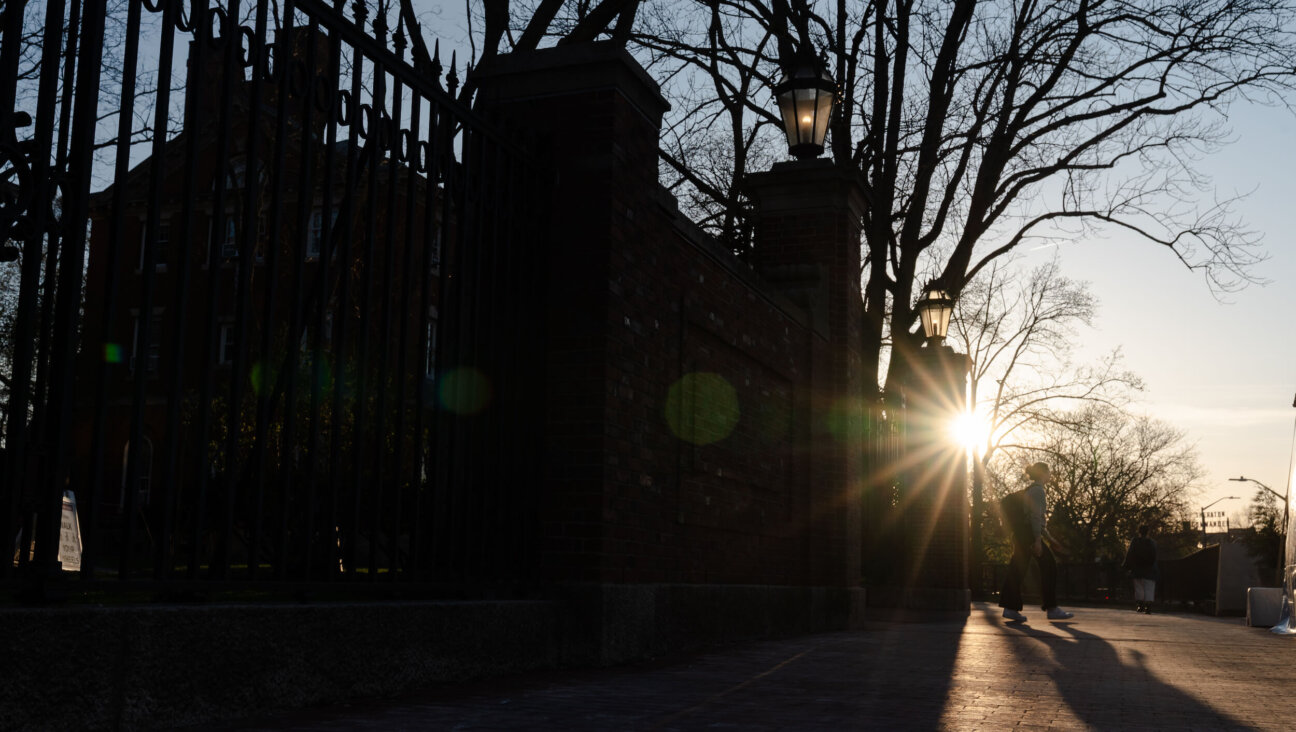Tree Charity Embroiled In New Flap Over Funds
An escalating dispute between the Jewish National Fund in Israel and its American-based fund-raising arm is raising questions about the way the American organization, one of the most prominent names in American philanthropy, is spending its money.
The fight revolves around an unpublicized effort by the Jewish National Fund in America to fund other environmental organizations in Israel besides JNF. The tensions have been fueled by a decline in the amount of money flowing to the Israeli organization from JNF America. In recent years, of the $30 million spent by JNF America, almost $10 million went to Israel. That figure dropped to $8 million last year, according to Russell Robinson, the chief executive officer of JNF America. He added that an additional $4 million is being held in an escrow account for JNF in Israel.
In addition to highlighting the tensions between the two entities, the controversy carries unpleasant reminders of a 1997 scandal over the amount of funds going to Israel from JNF America.
Known in Israel as Keren Kayemeth LeIsrael, JNF is a 104-year-old organization founded in what was then Palestine to develop the land for Jewish settlement. Among American Jews, JNF is known for its iconic blue tin collection boxes and for its work planting trees in Israel. The American affiliate was founded in order to raise funds for JNF activities in Israel.
Robinson said that the new policy of funding multiple recipients is part of his organization’s move to become “a central address for giving in Israel.” So far, the annual amount going to other groups in Israel is less than $1 million, but the move drew a sharp rebuke from a top official at JNF in Israel.
“JNF was established 100 years ago, with one obligation — to support KKL projects in Israel,” said a senior official at the JNF in Israel, who spoke to the Forward on condition of anonymity.
“To decide to give to other organizations is to betray the aim of the organization. It’s a total disloyalty to the original course of the organization,” the official added.
The allocations fight comes nine years after JNF was wracked by controversy over the way JNF America was spending its charitable funds — a scandal that eventually caused a total overhaul of the leadership in 1997, with Robinson becoming the organization’s CEO and cosmetics heir Ronald Lauder becoming chairman.
The controversy in the 1990s was sparked by media reports that only about 20% of the American branch’s total income was being sent to Israel. At the height of the scandal, only $5.2 million was transferred to JNF in Israel out of the $32.1 million spent by JNF America, according to 1996 tax documents.
As part of the American affiliate’s effort to reform itself, a special committee set a goal for the organization of “sending 70% of its income to Israel,” while “the other 30% would support overhead costs and what JNF terms ‘Zionist education,’” according to a February 1997 report in The Jewish Advocate, a weekly newspaper in Boston.
Robinson said that the Jewish Advocate report about the 1997 goal of sending 70% to Israel was either a “misquote” or “exaggerated.”
Either way, tax filings from 2003 — the last year for which tax documents are publicly available — indicate that JNF America failed to send even 50% of its income to Israel.
In 2003, only $11 million, or 36% of the $30.4 million raised by the America fund-raising arm, went in direct grants to Israel, according to the chief financial officer of the American fund-raising arm, Mitchell Rosenzweig. That included just under $1 million sent to organizations other than JNF.
In an audit from that year, JNF America reported that it spent $15.8 million on Israeli projects. According to Rosenzweig, that figure included the $11 million sent to Israeli organizations, with the rest of the money being spent in America to cover the costs of processing and administering the Israeli grants, including electric bills, rent, wages and other expenses. In addition to paying for these expenses, the American fund-raising arm spent a separate $9 million on fund-raising and overhead costs in 2003.
In explaining his organization’s current spending policies, the CEO of JNF America said that his group “front loads” the administrative expenses so that all the money that reaches Israel can be spent purely on projects there.
One such Israel project is JNF’s popular tree-planting program, which took up $4.4 million of the $15.8 million listed as being spent on Israel projects in 2003.
The costs of the tree-planting program are not broken down in the American branch’s tax forms or audit. But Rosenzweig said that of the $4.4 million, $1.76 million went to JNF in Israel for tree-planting there. The other $2.65 million was required for processing the telephone orders and sending out certificates to the buyer.
Daniel Borochoff, founder and president of the American Institute of Philanthropy, which rates national charities, criticized that ratio: “I think if they actually presented these numbers, it wouldn’t be a very attractive case when they said, ‘Give us $4.40 so we can spend $1.75 to plant a tree.’”
The tax forms from 2004 have not yet been filed, and the exact amount that reached the JNF in Israel last year is in dispute. According to documents provided by a senior JNF official in Israel, from January 2004 to January 2005, the organization only received $5.5 million last year from JNF America. Robinson said the figure was $8 million.
According to Robinson, JNF America had aimed to send $12 million to JNF in Israel last year, but $4 million was held in an escrow account that was created because of oversight concerns.
Robinson said the American branch made the decision early last year to filter funds through an escrow account after JNF in Israel weathered a strike and had to fire 250 people.
“They had their difficulties in restructuring,” Robinson said. “We didn’t want to be caught up in that, so we felt it was prudent to establish an escrow account and only transfer the money as the projects are completed.… We wanted to make sure we are fiscally responsible.”
In addition to the strike last year, JNF in Israel has suffered a number of recent controversies, including a land-buying scandal in the West Bank (see story above). But in 2003, before these controversies, and before the opening of the escrow account, the American fund-raising arm began giving to non-JNF charities in Israel.
An article last week in the Israeli newspaper Globes asserted that the current tensions stem from a power struggle between Lauder, who has close ties to Likud officials in Israel, and the chairman of the JNF in Israel, Yechiel Leket, a Labor Party veteran. Lauder issued a statement denying that a feud exists. Leket said, “No comment.”
Robinson said that the changes in giving patterns came about because JNF donors in America sometimes have different priorities than JNF in Israel has, particularly when it comes to developing the Negev.
“They may have a request for a reservoir but we can’t find donors,” Robinson said. “We had donors who wanted to build communities in the Negev.”
This year, for the first time ever, JNF America is giving to an organization called Aley Negev, which is building a 500-bed unit for the mentally disabled in the Negev community of Ofakim.
The Forward is free to read, but it isn’t free to produce

I hope you appreciated this article. Before you go, I’d like to ask you to please support the Forward.
Now more than ever, American Jews need independent news they can trust, with reporting driven by truth, not ideology. We serve you, not any ideological agenda.
At a time when other newsrooms are closing or cutting back, the Forward has removed its paywall and invested additional resources to report on the ground from Israel and around the U.S. on the impact of the war, rising antisemitism and polarized discourse.
This is a great time to support independent Jewish journalism you rely on. Make a Passover gift today!
— Rachel Fishman Feddersen, Publisher and CEO
Most Popular
- 1

News Student protesters being deported are not ‘martyrs and heroes,’ says former antisemitism envoy
- 2

News Who is Alan Garber, the Jewish Harvard president who stood up to Trump over antisemitism?
- 3

Politics Meet America’s potential first Jewish second family: Josh Shapiro, Lori, and their 4 kids
- 4

Fast Forward Suspected arsonist intended to beat Gov. Josh Shapiro with a sledgehammer, investigators say
In Case You Missed It
-
Fast Forward Jewish students, alumni decry ‘weaponization of antisemitism’ across country
-

Opinion I first met Netanyahu in 1988. Here’s how he became the most destructive leader in Israel’s history
-

Opinion Why can Harvard stand up to Trump? Because it didn’t give in to pro-Palestinian student protests
-

Culture How an Israeli dance company shaped a Catholic school boy’s life
-
Shop the Forward Store
100% of profits support our journalism
Republish This Story
Please read before republishing
We’re happy to make this story available to republish for free, unless it originated with JTA, Haaretz or another publication (as indicated on the article) and as long as you follow our guidelines.
You must comply with the following:
- Credit the Forward
- Retain our pixel
- Preserve our canonical link in Google search
- Add a noindex tag in Google search
See our full guidelines for more information, and this guide for detail about canonical URLs.
To republish, copy the HTML by clicking on the yellow button to the right; it includes our tracking pixel, all paragraph styles and hyperlinks, the author byline and credit to the Forward. It does not include images; to avoid copyright violations, you must add them manually, following our guidelines. Please email us at [email protected], subject line “republish,” with any questions or to let us know what stories you’re picking up.











